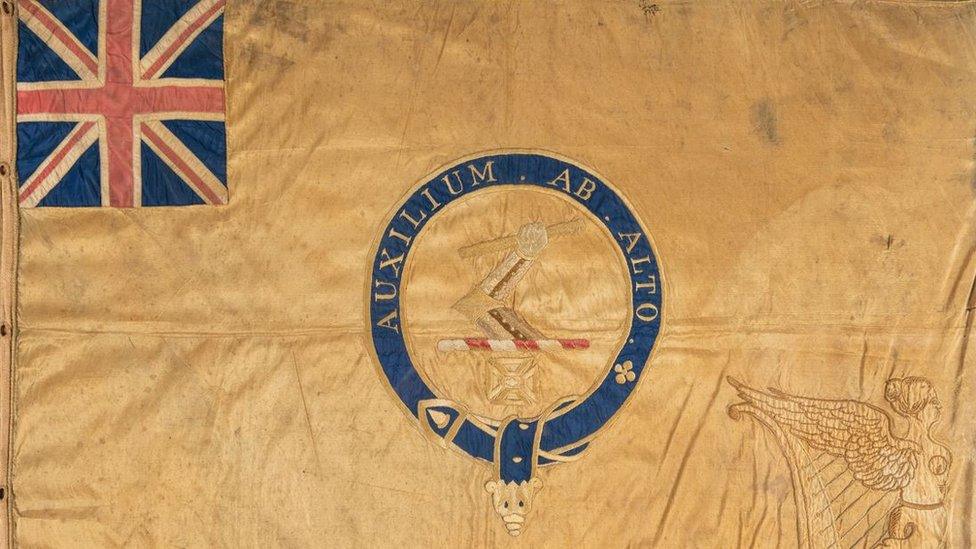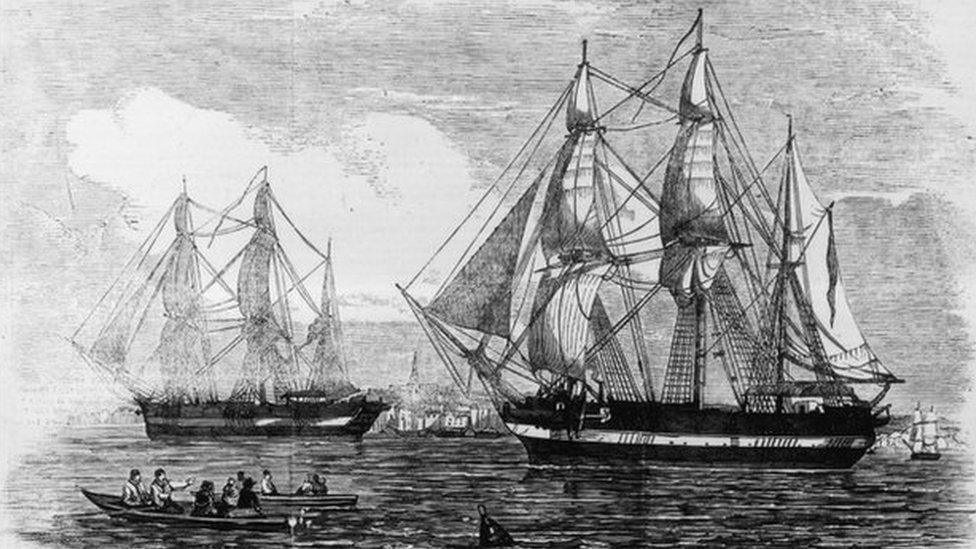Royal Navy Museum aims to keep Irishman Henry Kellett's flag in UK
- Published

The rare polar sledge flag of a "proud Irishman" and notable 19th Century naval officer could be lost to the UK.
Born in County Tipperary, Capt Henry Kellett led two Arctic expeditions to search for Sir John Franklin's lost ships.
HMS Erebus and HMS Terror disappeared with all their crew and were not found for more than 160 years.
The UK government had put a temporary export bar on a personal flag from the sledge Kellett used on the searches.
It was valued at £120,000.
The National Museum of the Royal Navy (NMRN) is making what it said was a "last-ditch" attempt to raise the money to keep it in the UK.
"It's so important because there are only half a dozen of these surviving from this period in polar exploration," Prof Dominic Tweddle from the museum told BBC News NI.
"The Art Fund, which is a funder of these kind of projects, have come in with £40,000.
"The museum has another £40,000, so we're £40,000 short."
The museum has obtained the backing of actor and writer Sir Michael Palin and broadcaster and historian Dan Snow for its attempt to acquire the flag.
The age of Victorian exploration
According to the Dictionary of Irish Biography, Capt Henry Kellett was born in Clonacody in November 1806.
He joined the Royal Navy in 1822 and during his career sailed to Africa and South America.

HMS Erebus and HMS Terror, as they appeared in Illustrated London News
In 1841 he was promoted to commander and served during the "opium war" in which British forces fought a trade war with China over the right to use Indian opium to buy Chinese goods.
But it was during two searches for Franklin's lost expedition that Kellett found fame as an explorer.
Sir John Franklin led HMS Erebus and HMS Terror and 129 men on a voyage in 1845 to chart the Northwest Passage in the Canadian Arctic.
The expedition's disappearance shortly after became one of the great mysteries of the age of Victorian exploration.
The British government sent a number of ships to search for the expedition from 1848 to 1859 without success.
'Proud Irishman'
Kellett led two searches, one aboard the famed HMS Resolute, which itself had to be abandoned in Arctic ice.
Timbers from the ship were later used to make the Resolute desk, which is used by presidents of the United States in the White House's Oval Office.
HMS Erebus and HMS Terror were eventually found in Canada's northern waters in 2014 and 2016.
BBC's Alpa Patel: "the mission set sail in high spirits and hope but contact was lost two years later"
Although Kellett had failed in his mission to find the ships he helped chart new routes through the Arctic.
"During the search for Sir John Franklin's lost 1845 expedition, Capt Kellett's voyages helped map out the northern extremes of North America for Britain," said the UK government when announcing the export ban on his sledge flag.
"The sledge flag, one of the earliest known in existence, helps to tell the story of British obsession in the 19th Century with arctic exploration and serves as an important reminder of the tragedy of Franklin's failed voyage."
The UK government imposed an export bar on the flag in September 2022 to allow time for a UK gallery or institution to buy it at the recommended price of £120,000.
Announcing the bar, the UK government described Kellett as a "proud Irishman" and a "famous Arctic explorer".
But that export bar is due to expire in mid-March and the NMRN is trying to raise the full cost of buying the flag in order to display it at Portsmouth historic dockyards.
Kellett served in the Royal Navy for almost half a century and died on 1 March 1875 at Clonacody in Tipperary where he was born.